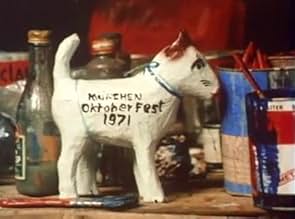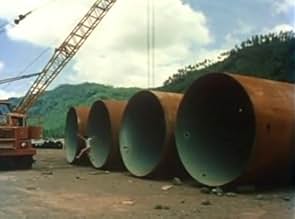Adicionar um enredo no seu idiomaKadu, a boy from Pakil, Laguna, experiences the dissolution of tradition as it gives way to capitalism in the form of Madame, a foreigner who initially came to their village as a customer du... Ler tudoKadu, a boy from Pakil, Laguna, experiences the dissolution of tradition as it gives way to capitalism in the form of Madame, a foreigner who initially came to their village as a customer during the Festival of Turumba.Kadu, a boy from Pakil, Laguna, experiences the dissolution of tradition as it gives way to capitalism in the form of Madame, a foreigner who initially came to their village as a customer during the Festival of Turumba.
Avaliações em destaque
I loved how this took its time even getting to the main story line, spending about a half hour on the local village and highlighting the people and the gentle rhythms of their culture. We get to know a family making beautiful paper mâché dolls to sell at a Catholic festival called Turumba, with the delightful grandmother being the master craftsman and everyone down to the children chipping in. The previous year they made 200 dolls which paid for family expenses during the part of the year the rice was growing, and this year they make 300 because inflation has been driving prices up. When a German woman spots the dolls in the market she not only buys them all up, but also makes a contract with the father of the family to produce 25,000 more for the 1972 Olympic games in Munich.
The family is quite happy with this immediate newfound wealth, as it allows them to electrify their house, enjoy the breeze of a fan, and get a television set among other things, but it comes at a price - they must work long hours to meet their deadline, even when threatened with a typhoon. It also means that this artwork they've produced with great care as a part of their culture must now be mass produced for an event that's outside of their culture, with the danger of losing a piece of themselves in the process.
In its gentle way, the film is obviously touching on an aspect of global capitalism, how it can corrode the local culture and lead to unfair (or child) labor practices. The grandmother calls the television the "idiot box" and a neighbor points out that his "wealth" is his ability to go off camping when he wants to, so there is resistance to the idea that "more is better." To see the kids feel the pressure of long hours, and to see the man hire the kids of others in the village to meet his production target, brings to mind real-world cases over a long history of exploitation, so there is clearly a critique here, especially in light of just how much manufacturing was outsourced in the decades after this film was made, targeting "cheap labor."
On the other hand, the work arrangement really isn't depicted as all negative by the film, just a truism of the ways of the world, and I didn't perceive it to be quite the slam of capitalism that many other viewers did. The family meets its deadline, the kids are proud of themselves, and everyone other than the grandmother is happy that they've bettered their living conditions (and she's mostly ambivalent). In a true display of their resilience, they then go off to celebrate Turumba. If anything, it's a bittersweet story of the westernization that seems inevitable, and a call to hold on to traditions as it takes place, which they do (at least this round).
You can extrapolate from how this film ends, imagining a German company setting up a manufacturing base here and doing what businesses do, drive costs down by paying workers as little as they can get away with, not worrying about environmental impact since it doesn't register on their bottom line, and putting profits in the hands of shareholders instead of the workers - but it's important to note that the film doesn't do this. The German lady is depicted as somewhat crude, throwing the dolls around, and leaving one behind even as she says that every single one counts, but mostly the film just contents itself with observing a rather limited, one-time interaction, which on the whole ended up positive. It's ironic to see those decrying modernization after watching the film on a premium streaming service and posting about it from their phones or laptops, but that's another subject I guess.
Setting aside what might be a Rorschach inkblot test, the reason for not rating the film a little higher was that its gentle ways became a little bit too gentle for me. There were points as the story line was playing out that it felt too slow, and my attention wandered. Glad I saw it though.
The family is quite happy with this immediate newfound wealth, as it allows them to electrify their house, enjoy the breeze of a fan, and get a television set among other things, but it comes at a price - they must work long hours to meet their deadline, even when threatened with a typhoon. It also means that this artwork they've produced with great care as a part of their culture must now be mass produced for an event that's outside of their culture, with the danger of losing a piece of themselves in the process.
In its gentle way, the film is obviously touching on an aspect of global capitalism, how it can corrode the local culture and lead to unfair (or child) labor practices. The grandmother calls the television the "idiot box" and a neighbor points out that his "wealth" is his ability to go off camping when he wants to, so there is resistance to the idea that "more is better." To see the kids feel the pressure of long hours, and to see the man hire the kids of others in the village to meet his production target, brings to mind real-world cases over a long history of exploitation, so there is clearly a critique here, especially in light of just how much manufacturing was outsourced in the decades after this film was made, targeting "cheap labor."
On the other hand, the work arrangement really isn't depicted as all negative by the film, just a truism of the ways of the world, and I didn't perceive it to be quite the slam of capitalism that many other viewers did. The family meets its deadline, the kids are proud of themselves, and everyone other than the grandmother is happy that they've bettered their living conditions (and she's mostly ambivalent). In a true display of their resilience, they then go off to celebrate Turumba. If anything, it's a bittersweet story of the westernization that seems inevitable, and a call to hold on to traditions as it takes place, which they do (at least this round).
You can extrapolate from how this film ends, imagining a German company setting up a manufacturing base here and doing what businesses do, drive costs down by paying workers as little as they can get away with, not worrying about environmental impact since it doesn't register on their bottom line, and putting profits in the hands of shareholders instead of the workers - but it's important to note that the film doesn't do this. The German lady is depicted as somewhat crude, throwing the dolls around, and leaving one behind even as she says that every single one counts, but mostly the film just contents itself with observing a rather limited, one-time interaction, which on the whole ended up positive. It's ironic to see those decrying modernization after watching the film on a premium streaming service and posting about it from their phones or laptops, but that's another subject I guess.
Setting aside what might be a Rorschach inkblot test, the reason for not rating the film a little higher was that its gentle ways became a little bit too gentle for me. There were points as the story line was playing out that it felt too slow, and my attention wandered. Glad I saw it though.
Principais escolhas
Faça login para avaliar e ver a lista de recomendações personalizadas
Detalhes
Contribua para esta página
Sugerir uma alteração ou adicionar conteúdo ausente




















